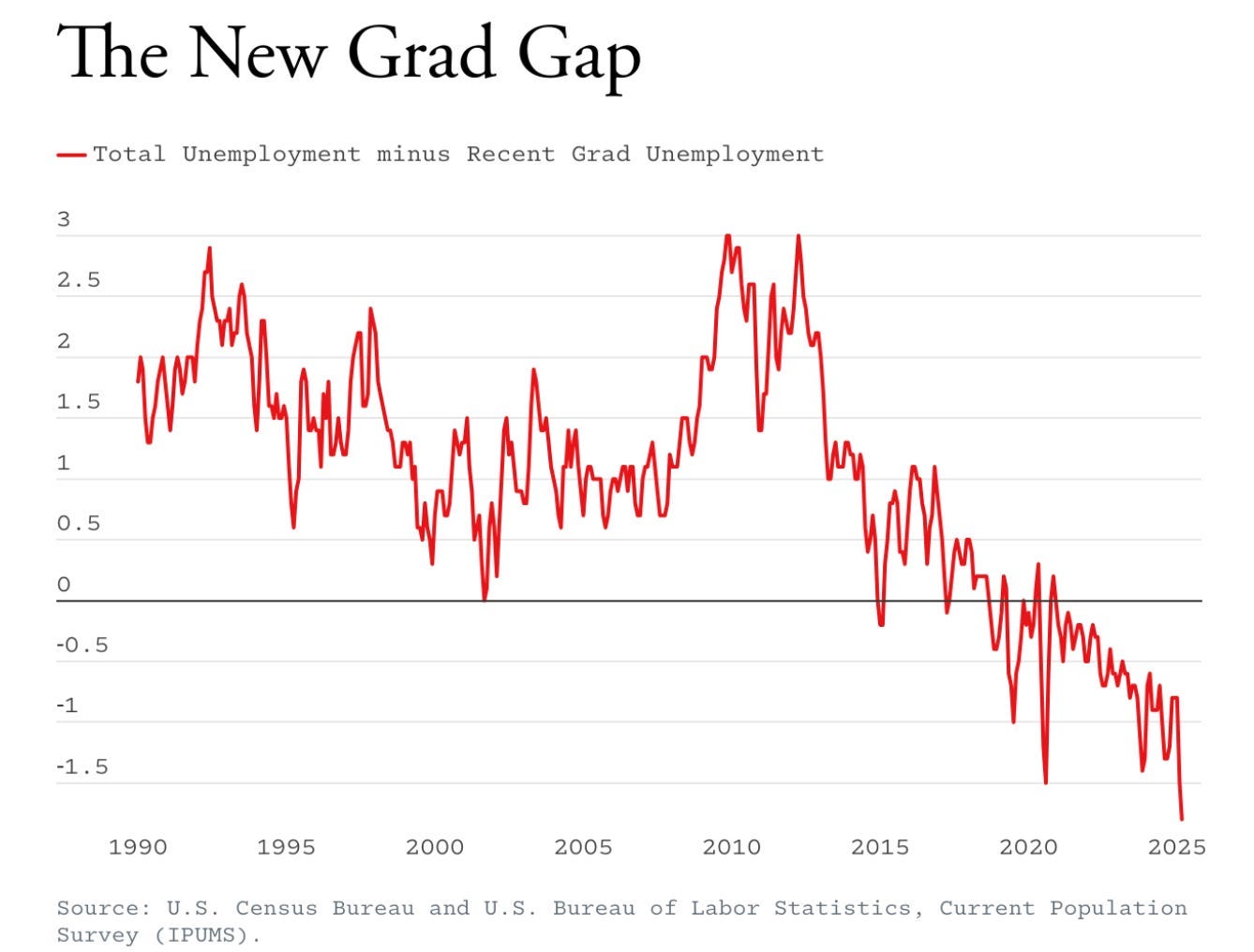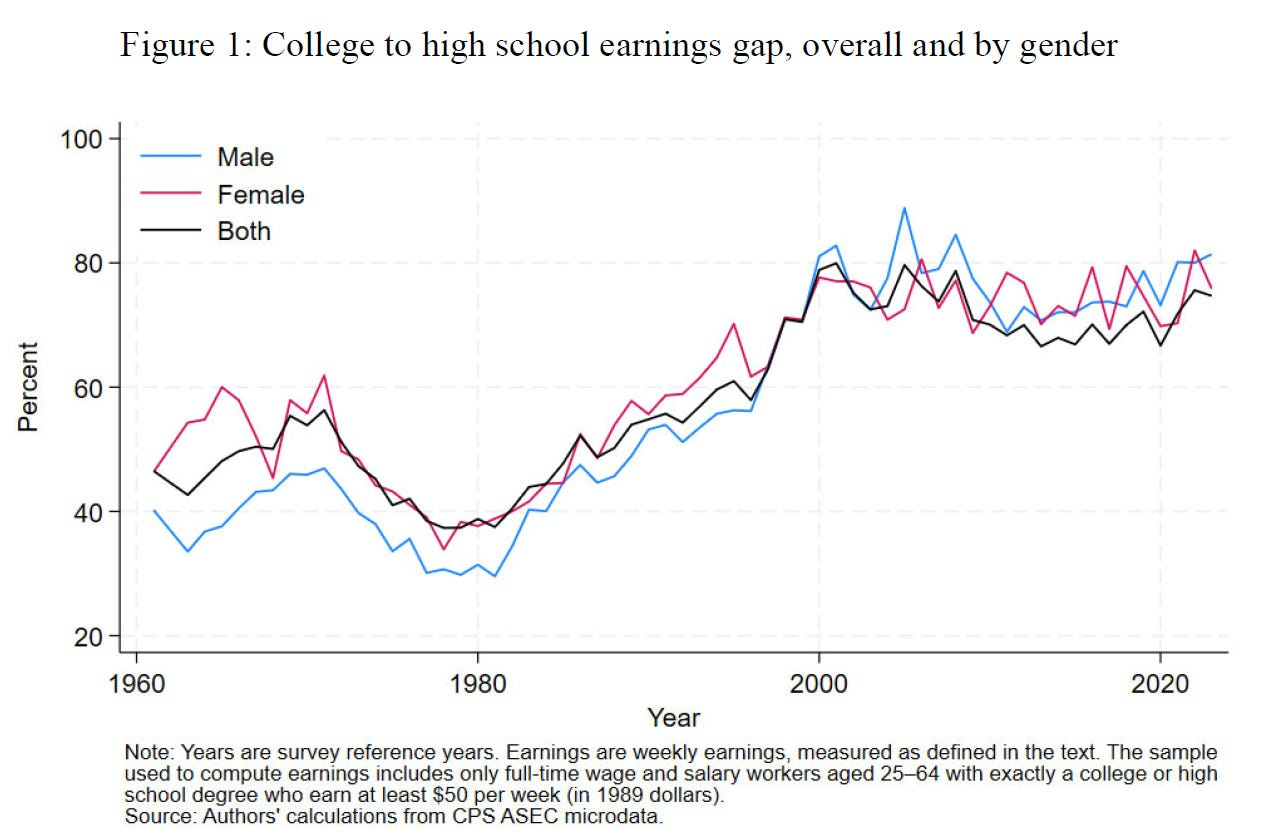- Scholastic Alchemy
- Posts
- Links and Commentary 6/19/25
Links and Commentary 6/19/25
AI Makes Kids Dumb, College Graduate Job Market, AZ Vouchers Hurt the Best Schools, Girls Still Score Lower than Boys at Math, Florida Sleep Mandate Falls Apart
Welcome to Scholastic Alchemy! I’m James and I write mostly about education. I find it fascinating and at the same time maddening. Scholastic Alchemy is my attempt to make sense of and explain the perpetual oddities around education, as well as to share my thoughts on related topics. On Wednesdays I post a long-ish dive into a topic of my choosing. On Fridays I post some links I’ve encountered that week and some commentary about what I’m sharing. Scholastic Alchemy will remain free for the foreseeable future but if you like my work and want to support me, please consider a paid subscription. If you have objections to Substack as a platform, I maintain a parallel version using BeeHiiv and you can subscribe there.
Using AI Makes Kids Dumber
Natalie Wexler over at Minding the Gap has the lowdown on a recent paper on AI use by students. She basically says AI leads to brain rot and doesn’t pull any punches. From the paper itself, we learn that using AI produces a “memory paradox” whereby users perform tasks proficiently, perhaps even better than non-AI participants, but remember very little of what they did or learned. More coverage from The Learning Dispatch. Everyone involved makes pretty much the same point. It’s important for everyone, but especially kids, to develop the capacity to remember things that they learn. Whether it’s factual, procedural, or conceptual, learning requires more than completing the task and offloading some of the work to an LLM or similar. The more we externalize these thought processes, the dumber we get. The paper’s authors argue this is only going to accelerate the reverse Flynn effect that’s been plaguing the US since the 1970s.
As a side note, I was looking for interesting new posts and writers on Substack earlier today. I clicked on the K-12 Education topic to see what was on offer. The first thirty posts it showed me were about AI in education. Which, like, yeah of course it’s important and we do need to talk about it. I led with it in these links. But it shouldn’t be the only thing we’re writing about!
College Grad Job Market
Paul Krugman posted recently about the job market for recent college graduates. Seems like it’s not a great time to be among the best educated ~30% of Americans. One surprise is that it’s not AI displacement. Not yet, at least. Interestingly, I’m not sure he really makes his point very clearly. He’s harsh, as you might expect, on the uncertainty of the Trump administration as a cause for businesses more or less freezing hiring, but much of the data he shares indicates that college graduate employment has been in a decline for much longer.

I’m not sure Trump’s Tariffs can travel back in time, no matter how bad they may be today.
If you’re interested in a deeper dive, Jessica Hoel over at The Liberal Arts Ledger wrapped up her 18-part course overview about The Economics of Higher Education. For example, this chart about the college wage gap might be related to college graduate employment.

Basically, college got you an increasing improvement over merely graduating high school until about 2000 and then it flattened out. Still better, but not growing.
College costs simply cannot remain where they are now if the wage premium and employment opportunities are not there on the tail end. No matter what we say about the need for well-rounded flourishing humans, we don’t have a society where people can borrow a hundred grand and then not get jobs. Something has to give.
Arizona Vouchers are Hurting the Best Schools (and charters)
Arizona 12News looked into the Arizona voucher program, among the most generous and flexible in the country. One of the main selling points of school vouchers used to be that they would be used by families to extricate kids from their “failing” urban public schools. What has actually happened, though, is that the majority of the recipients never attended public school in the first place. The vouchers add to the state’s school budget instead of reducing because most spending is not on kids leaving public school. But, as 12News finds out, the small percentage of kids who do leave public schools end up being from the best districts and charters.
However, a 12News investigation has found that many of the best public districts and charter schools in Arizona are among the biggest losers when it comes to vouchers. That’s because families are taking their kids out of those schools and using vouchers for private or home schooling.
This includes 400 students departing the Basis Charter school which was ranked as the US News best high school in America.
It’s time to stop pretending vouchers are about anything other than subsidizing the wealthiest families with public tax dollars. Charters. Publics. Doesn’t matter. We’re all hurt by voucher programs. It should be concerning, then that the Trump admin is trying to create a federal version. More coverage here from Peter Greene.
Why do Girls still score lower than Boys at Math?
We’re supposed to believe that boys are in the midst of a crisis, especially with regard to school. While I have no doubt that the data are accurate, I have my doubts. Maybe it gets an I’m Skeptical post in a week or two? One of the reasons I’m skeptical is that boys still dominate math-heavy fields and fields adjacent to math-heavy fields. Katie JGLN gives us an excellent rundown of the barriers girls face when it comes to learning math. Far from being an innate difference, girls math performance seems intertwined with school climate, teacher expectations, social stereotyping, and familial gender roles.
The researchers point out that all this evidence strongly suggests the difference in maths scores between boys and girls isn’t due to ‘innate’ ability — or lack thereof — but rather to the environment they encounter once they begin school. As they write in the paper:
Primary school may mark the moment in children’s curriculum when maths-related activities or exercises (…) start to be more clearly identified as belonging to the maths domain, with separate school textbooks and teaching hours for maths subjects. This sudden labelling of maths-related activities as ‘maths’ (…) might give space for gender stereotypes surrounding maths to emerge, to be internalised by children and, eventually, to affect their self-concept and performance.
Primary school teacher attitudes may contribute to this dissemination, if teachers interact differently with boys and girls, transmit their maths anxiety to girls, encourage girls’ efforts at reading more than at maths, or attribute the successful mathematical performance of boys to their greater intellectual power and the successful mathematical performance of girls to their greater diligence.
Something to keep in mind for my girls as they enter primary school.
Florida Sleep Initiative Falls Apart
Last week I linked Tim Daily’s post about how kids need more sleep and that we probably underrate the impacts of a generation getting poor sleep. Florida had attempted to start high school later in an effort to get kids to sleep longer and help their academic performance. Sadly, that effort seems to have failed. The problem? Most schools simply didn’t change their start times.
Adolescents who are chronically sleep deprived are at greater risk of anxiety and mood disorders, motor vehicle accidents and poorer grades. The American Academy of Pediatrics, American Academy of Sleep Medicine and American Medical Association have all recommended that middle and high schools begin no earlier than 8:30 a.m.
But in Florida, only 24 percent of public high schools start that late, according to a survey conducted for the Legislature. Nearly half begin before 7:30 a.m.
“It doesn’t matter if you tell kids they should get healthy sleep if you create a system in which they can’t,” said Terra Ziporyn, a science historian who founded Start School Later, an advocacy group.
They also mention that the move to repeal the unfunded, unenforced state mandate has some localism vibes. Apparently the top-down nature of the rule made it unpopular. This seems to be yet another case of scholastic alchemy!
Thanks for reading!